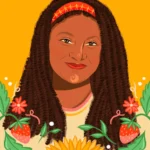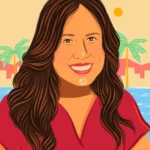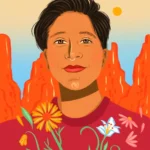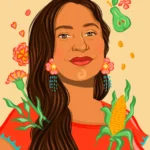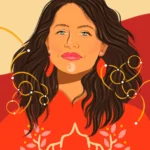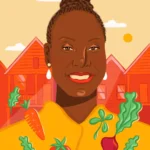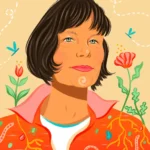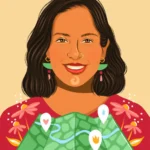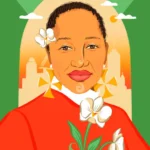Wisdom on Scale + Seeding Systemic Transformation
When asked to explain how they bridge the work that they do in their immediate communities with larger efforts for broad, systemic transformation, Climate Resilience contributors responded with their theories of change:
Build Locally and Organize Translocally
“I’ve found it helpful to think about it through the place-based, translocal organizing frame. We have a very specific context for the Just Transition we’re trying to win here; our vision for this bioregion and how we end up governing is going to look very specific and different than it will in Buffalo, for instance. We have different stakeholders and complexities here. So for us, it’s about sharing our strategies and wins and moving the dial for what’s politically realistic and sharing that across place; scaling out instead of scaling up. One of the metaphors I really appreciate when we talk about translocal organizing is how we are not building like a giant bowling ball but like a nimble sack of marbles that can scatter out. Because so many of our wins start at a local level. Those big federal policy wins usually come about because so many locales have done some wildly great stuff. Top-down changes rarely happen. So it’s about practicing the world that we want. With the nimble sack of marbles it’s easier to do that. It’s also harder to get targeted if we have a diversity of form and function in our movements.”
Deseree Fontenot![Illustration of Deseree Fontenot]()
“Several years ago, Movement Generation, an organization that Urban Tilth has a relationship with, began to work really intentionally with other grassroots groups to define the Just Transition. A group of us started doing these informational exchange visits. We called it trans-local organizing. We visited urban farms in Detroit and connected with folks in Kentucky who are in the coal mining area and Native Alaskan communities who are impacted by the petroleum and steel industries. It planted so many ideas in our heads.”
Doria Robinson![Illustration of Doria Robinson]()
“Groundwork USA is a national organization with local roots in 21 communities across the country. Ultimately, all the work we’re doing on the ground has to start with the people in the immediate area. It needs to be very specific, responsive to the needs of the local residents, and rooted in relationship-building. However, we can pull lessons from the local level up to the national conversation and figure out what might be an empowering strategy elsewhere, and then we can tailor that strategy to fit another community’s context.”
Cate Mingoya-LaFortune![Illustration of Cate Mingoya LaFortune]()
“There’s a lot of knowledge sharing and collaboration between folks who do this work in different regions. Sometimes I’ll reach out to a partner that does similar work to me in the Bay Area, Central Coast, or Sacramento, and vice versa. So, once in a while, my work becomes linked to climate resilience efforts elsewhere.”
Natalie Hernandez![Illustration of Natalie Fernandez]()
“In Uplift Climate’s vision for the future, public lands and borders wouldn’t even exist because our relationship with land would be totally transformed. The nation state would be dissolved. It’s a radical vision. I can only think about such absolutely transformational change through the lens of adrienne maree brown’s emergent strategy; if we can live in our communities, take care of one another, make decisions, and organize together in the way that we want to see, then that world actually exists. It’s the very small scale creating the pattern for what happens at the large scale. As Uplift Climate focuses on connecting climate justice activists, learners, and allies across the whole regional Southwest, sharing resources, skills, and building relationships, I think that’s how small-scale change grows. We learn from others.”
Olivia Juarez![Illustration of Olivia Juarez]()
“I left my hometown community to support the work for the restoration of salmon, but really I left my hometown community to let the salmon support and teach me how to be. Just in the same way that they leave their creeks and home to go out to the ocean, to learn and to grow, to feed the whales, and everything they do in the ocean, I really feel like, in following the salmon here to California, and the way that work has taken me all over the world, it’s really helped me to meet people around the world who are also trying to fight for solutions to climate change in their hometowns, and it’s allowed me to bring all of those learnings home. It’s allowed me to see that what’s happening locally is a microcosm of what’s happening globally. And the same solutions that we advocate for at a global level around climate reparations and climate mitigation and frontline voices first and Indigenous women and Two Spirit people first, that’s the same thing we need to do locally. And, there’s so much I don’t know and so much I have to learn from my community about the everyday lived experience. I have this really deep insight that comes from a global analysis of where we’re located in the struggle for collective liberation, and that needs to be paired with the local wisdom.”
Niria Alicia![Illustration of Niria Alicia]()
Optimize for the Ripple Effect
“I’ve begun to think, if I live in an interconnected way, most of the things that I do create a ripple effect around me, and I don’t have to feel responsible for creating all of the impact. Therefore, a big question for me right now is how enterprises can start to mimic the web of life, so to speak. One-on-one relationships are crucial, but I think that we really create that ripple effect when we build multi-stakeholder networks.”
Marta Ceroni![Illustration of Marta Ceroni]()
“When I say that we train 55 individuals, we’re really training 55 families. Most people don’t get that. When we train people to grow food, they’re taking that home. They’re growing fresh food in their yards, they’re sharing their new skills and their excitement for fresh produce with their loved ones, and they’re coming home calmer and more confident. That’s how you impact the community.”
Janelle St. John![Illustration of Janelle St. John]()
“Vijay Kumar watched this talk [from our annual soil sponge conference] about restoring water cycles that we posted [on the Internet] and decided to try something he calls pre-monsoon dry sowing, or putting seeds in the ground before any rain has come. It worked. And since he was able to tap into [India’s Self-Help Group] network (which includes about twenty million women across the country), there are countless farmers now growing a full crop of food before the rains. This means that they’re dramatically extending the green season, growing that much more food, harvesting that much more water through dew capture, cooling the area through transpiration, and growing the soil sponge. It’s just such a reminder that the little things you do can end up having such an impact. Thirty people came to that conference, so it’s not about scale. You just need one Vijay Kumar to watch the poorly made video. Forget being perfect, and just do. Share it with the world. Trust that you’re in the flow, and focus not on scale or success but on doing the next right thing.”
Didi Pershouse![Illustration of Didi Pershouse]()
Build Deep to Build Out
“We’re able to build statewide power through electoral campaigns and legislative advocacy precisely because we’ve been building deep roots in community for over 25 years. Because we’ve been really place-based about where and how we organize, we’ve cultivated trust and authentic relationships. We’re able to uplift the deep expertise and storytelling of our community members. So, though policies at the state level feel a bit far removed, we know that they have significant implications for the communities that we organize and work in.”
Amee Raval![Illustration of Amee Raval]()
“For me, I believe that all organizing really is local. National movements can mobilize local people, but if you want real, systemic policy change, it has to flow from the local level. Because you can pass a bill and then it doesn’t reach anybody. You can build a consensus for something and then find out that it can’t materialize. For me, national organizing should be a convening of strong, local organizers, to figure out how to scale up and to share what’s working well elsewhere. But the idea that you organize from a national level down, I have found so ridiculous. I hope to never become a national figure with no local base. That, for me, would be a total failure of my values. And I love folks who are like that, and I’m not trying to hate on them, but my theory of change is that real organizing is local, and then we scale that up.”
Mariama White-Hammond![Illustration of Reverend Mariama White Hammond]()

